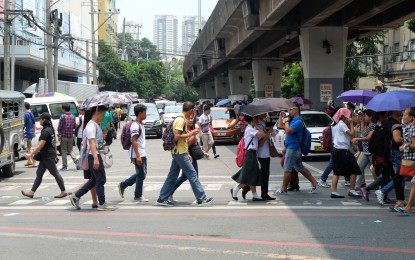
(File photo)
MANILA – The Philippines remains one of the "fastest" economies in Asia, despite the slowdown in its growth momentum in the second quarter of 2023, an economist said on Saturday.
In a weekly forum in Quezon City, Rizal Commercial Banking Corp. (RCBC) chief economist Michael Ricafort said the full economic reopening after the lifting of the nationwide state of public health emergency due to the coronavirus disease 2019 (Covid-19) in July has propelled growth and boosted activities.
“Dahil nagbukas na po ‘yung ekonomiya, wala na pong restrictions ‘no. Lalo na ngayon, wala na po talagang bawal formally since July. Mahigit dalawang buwan na po na na-lift na po iyong Covid state of public health emergency (Because the economy has opened up, there are no more restrictions. Especially now, nothing is really forbidden formally since July. It's been more than two months since the Covid state of public health emergency has been lifted),” he said.
"Maaaring nagkaroon ng downward adjustment sa growth targets, mga nasa 5 percent level from 6 percent level. Karamihan po, ‘yung original assessment po, mga nasa 6 (There may have been a downward adjustment in the growth targets, to the 5 percent level from the 6 percent level. Most of them, the original assessment was about 6 percent). But that is still among the fastest in the region dahil maganda po iyong ekonomiya natin (because our economy is good).”
According to the International Monetary Fund, the growth of the Philippine economy slowed to 4.3 percent in the second quarter but is projected to bounce back to 5.3 percent by the yearend and reach 6 percent in 2024.
Ricafort said all industries in the country, including the tourism sector, are now picking up, opening up more job opportunities.
He said the latest employment rate in the country is “among the best in 17 to 18 years.”
“If we are to put things in the proper perspective, at least ngayon may mga hanapbuhay na (there are now more job opportunities),” he said. “Mababa iyong unemployment rate dahil nagbukas na ‘yung ekonomiya. Mataas ‘yung employment (The unemployment rate is low because the economy has opened. There is high employment).”
The number of employed Filipinos was estimated at 48.07 million, higher than the reported 44.63 million in July and 47.87 million last year, according to latest data from the Philippine Statistics Authority (PSA).
The employment rate was recorded at 95.6 percent.
The PSA also noted that the number of unemployed Filipinos fell to 2.21 million in August this year from 2.68 million in the same month in 2022 and 2.27 million in July this year.
Ricafort said the reopening of schools is also playing a big part in the revitalization of businesses, especially micro, small and medium enterprises.
On the higher inflation recorded in September, Ricafort said the steady rise in rice prices is a major contributor to the upward trend in the prices of basic goods.

“So, bakit po importante ‘yung bigas (why is rice important)? Rice accounts for nearly 9 percent of the inflation basket. Eh umakyat po kasi ‘yung presyo ng bigas, ‘yun po ‘yung realidad, lalo na mula noong mga (The price of rice increased, that’s the reality, especially in) July, August,” he said.
"Ang ambag po kaagad niyan (Its contribution) would be somewhere around hundred to even close to 200 basis points. One to two percentage points iyong dagdag (would be added). ‘Yung sa 6.1 po na ‘yun, kung hindi lang tumaas ‘yung presyo ng bigas, siguro nasa 4 percent lang po ‘yung inflation natin (That 6.1 [percent headline inflation], if the price of rice didn't increase, maybe our inflation would only be at 4 percent).”
Headline inflation settled at 6.1 percent in September this year, higher than the 5.3 percent recorded in August, the PSA reported Thursday.
For rice alone, inflation went up to 17.9 percent in September from 8.7 percent in August. (PNA)
